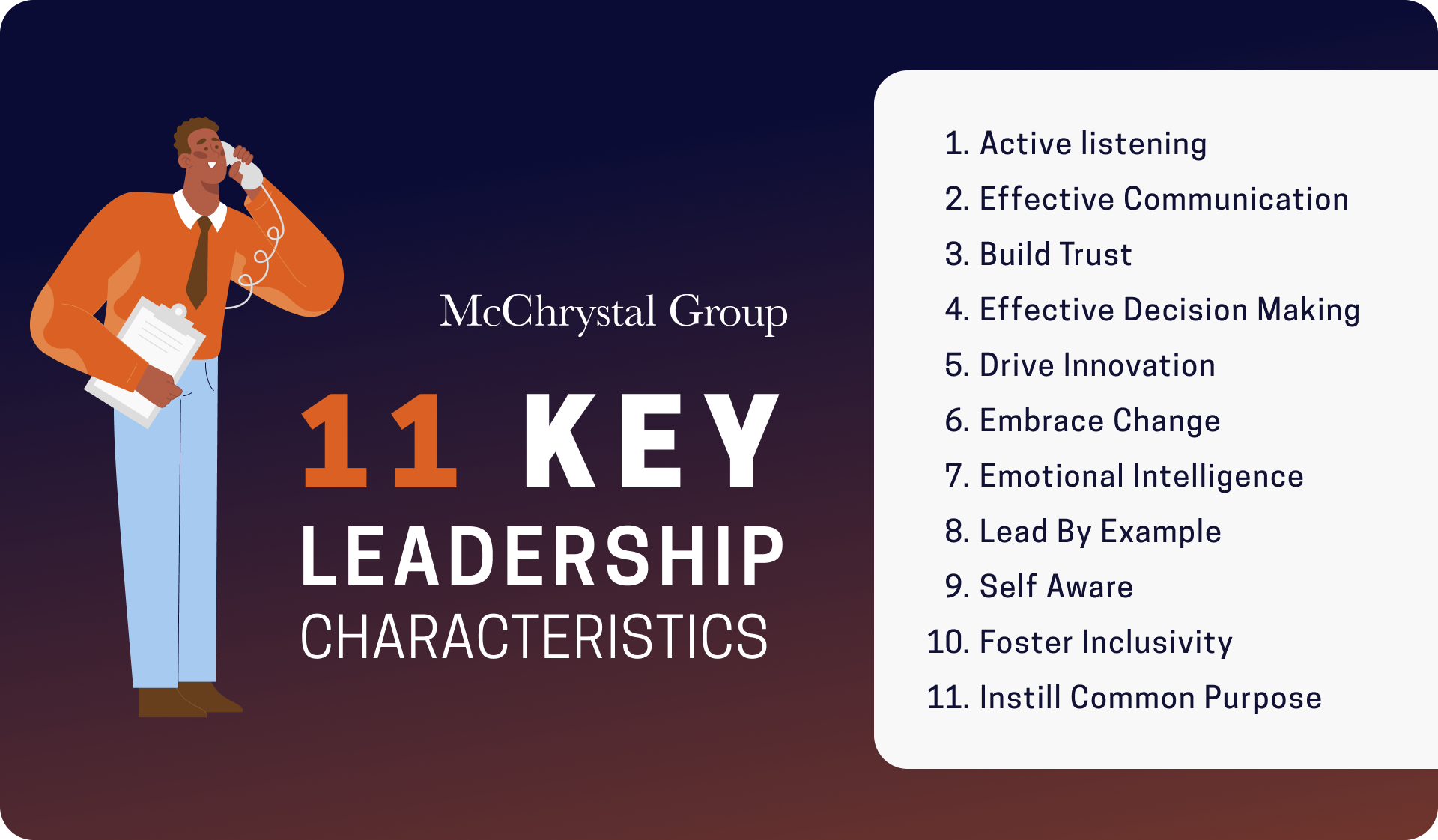Organizational success hinges on leaders who actively listen, demonstrate effective communication, build trust, can effectively make decisions, drive innovation, and embrace change. They should have high emotional intelligence, lead by example, self-awareness, and instill common purpose. Learn these key leadership characteristics and how to apply them at all levels of your organization.
What are the Qualities of a Great Leader?
Great leaders make great organizations. These leaders possess skills and qualities that enable them to guide their teams toward shared goals. Every organization needs a great leader to drive performance, sustain employee engagement, improve productivity, and cultivate a positive culture.
Behaviors of Good Leadership
McChrystal Group has amassed more than 5 million data points from thousands of respondents worldwide to understand the qualities and traits of a good leader. We call these “leader behaviors,” and more now than ever, leaders must have a unique set of behaviors to excel in a complex world.
Here are the 11 key leadership characteristics crucial for organizational success:
- Active Listening
- Effective Communication
- Build Trust
- Effective Decision Making
- Drive Innovation
- Embrace Change
- Emotional Intelligence
- Lead By Example
- Self Aware
- Foster Inclusivity
- Instill Common Purpose

Active Listening
Empathy and active listening are vital leadership characteristics. Effective leaders understand the importance of truly listening to their team members and seeking to understand their perspectives and concerns. By showing empathy and considering the needs and feelings of others, leaders can foster a supportive and inclusive culture where team members feel valued and motivated to contribute their best.
Effective Communication
Communicating effectively and inspiring others is essential for any leader at any level. Effective communication is the foundation of quality leadership, allowing leaders to convey their vision, goals, and expectations to their team members. Clear communication ensures everyone is on the same page and working towards a common objective. Inspiring others through words and actions can motivate and encourage team members to give their best and achieve extraordinary results.
Effective communication strategies play a vital role in enhancing collaboration within teams. Leaders should encourage open and transparent communication channels, where team members feel comfortable expressing their ideas, concerns, and feedback. Clear and concise communication helps to minimize misunderstandings and ensures that everyone is on the same page. Leaders can facilitate effective communication by actively listening to their team members, providing constructive feedback, and fostering a culture of trust and psychological safety.
Build Trust
Building trust and fostering strong relationships with team members is crucial for effective leadership. The best leaders know how to build and maintain trust within their teams and across their organization. Trust is the foundation of any successful team, and leaders must prioritize open communication, transparency, and accountability. By demonstrating integrity and consistently delivering on commitments, leaders can earn the trust and respect of their team members, creating a positive and collaborative work environment.
Effective Decision Making
Decision-making skills and the ability to be decisive are vital for effective leadership. Leaders must make tough choices and take calculated risks to move their organizations forward. Being decisive and having a clear thought process allows leaders to make timely decisions, instill confidence in their team, and maintain momentum. However, leaders need to balance being decisive and seeking input from others to ensure well-informed decisions.
Drive Innovation
Effective leaders understand the importance of encouraging creativity and fostering a culture of innovation. By providing the necessary support and resources, leaders can empower their teams to think outside the box, explore new ideas, and take calculated risks.
A culture of innovation is essential for organizations to stay competitive in today's rapidly evolving business landscape. Leaders can promote this culture by encouraging collaboration, rewarding innovative thinking, and creating a psychologically safe environment for employees to share their ideas. By valuing creativity and providing opportunities for intelligent failure, leaders can inspire their teams to seek new solutions and approaches continuously.
Embrace Change
Adaptability promotes a growth mindset and embraces change. Leaders who adopt a growth mindset believe that talents and abilities can be developed through dedication and hard work. They encourage their teams to embrace challenges, view failures as learning opportunities, and continuously seek personal and professional growth.
Emotional Intelligence
Another important characteristic of a good leader is emotional intelligence. Emotional intelligence refers to the ability to recognize, understand, and manage one's own emotions and the emotions of others. Leaders with high emotional intelligence can build strong relationships, empathize with their team members, and effectively resolve conflicts. This skill is precious in challenging situations where leaders must make tough decisions while considering the impact on their team's morale and well-being.
Lead By Example
Leading by example is another powerful way to inspire a culture of continuous improvement. When leaders demonstrate a commitment to learning and growth, it creates a ripple effect throughout the organization. Leaders show their teams that improvement is a shared responsibility by actively seeking feedback, graciously embracing advice, and acting on suggestions.
Instilling ethical values in teams and fostering integrity are essential to effective leadership characteristics. Leaders with strong moral values inspire trust and create a culture of integrity within their organizations. Ethical leadership ensures that decisions are made with transparency, fairness, and accountability.
Self Aware
Self-aware leaders can enhance their abilities and positively impact their teams by focusing on self-awareness and continuous personal growth. One strategy for self-awareness is to engage in introspection and reflection regularly. Evaluating strengths, weaknesses, and areas for improvement allows leaders to gain a deeper understanding of themselves and their leadership style. This self-awareness enables leaders to make better decisions, manage their emotions effectively, and adapt their approach to different situations.
Foster Inclusivity
When individuals from different backgrounds, experiences, and perspectives come together, they bring a wide range of ideas and insights to the table. This diversity fosters innovation and creativity, leading to more effective problem-solving and decision-making processes. By embracing diversity, leaders can create an inclusive environment where team members feel valued, respected, and empowered to contribute their unique perspectives.
Instill Common Purpose
Leaders at all levels must strive to create a shared vision and align team goals directly with organizational objectives. When everyone on the team understands the purpose and direction of their work, they can work together towards a common objective. A shared vision provides clarity and helps team members prioritize their efforts, ensuring that their individual contributions align with the team's overall goals. Effective leaders communicate this vision regularly, ensuring it remains on everyone's mind.
Four Leadership Capabilities of High-Performing Organizations
best when they quietly meet four essential human needs:
When teams meet these needs, team members don’t require external motivators because they are driven from within. In fact, team members may see the improvements that make their teams work better, smarter, and faster. But they don’t ever have to know those same improvements are making them happier. They’ll simply want to achieve big things together because now teamwork feels the way it’s supposed to: good. Download our "The 4 Secrets High-Performance Organizations Know About Teams" to build a high-performing organization.
Foster Connection
The human need to feel connected to others is more fundamental than food and shelter. In fact, studies show we unconsciously equate our connection to others with our personal well-being. Why does that matter? Connection is a powerful incentive for teams to work together. Unfortunately, a common barrier to connection between teams is tribalism. And as organizations grow, the characteristics that distinguish teams (e.g. specialty, location) also grow into more pronounced “us and them” divisions. When organizations ask us to remove these barriers of tribalism, we do so by installing a capability called Shared Consciousness.
Promote Psychological Safety
A high-performing culture requires an environment where individuals feel safe expressing ideas, taking risks, and admitting mistakes without fear of negative consequences. Leaders must promote psychological safety by encouraging open dialogue, listening without judgment, and supporting team members when taking calculated risks. This behavior leads to greater creativity, faster problem-solving, and overall team resilience.
Create Belonging
Big organizations tell us they want to move faster, but their teams move too slow. A few follow up questions often reveal a deeper issue: “We’re not all rowing in the same direction.” It’s common to hear this following a period of growth. After more people, areas, and priorities have been added to the mix, organizations find it hard to bring everyone together. Even harder to move at the pace their competitive environment demands. This lack of alignment (and its results) aren’t difficult for leaders to spot, but what typically eludes them is the core issue: a lack of belonging. Studies show our desire to belong to something bigger than ourselves is a more powerful motivator than money. So teams that meet this need perform better than those that do not. To remove these barriers of unawareness, we install the capability of Common Purpose: a single “why” for everyone. A Common Purpose replaces unawareness with a shared vision. Teams not only know how they fit into the organization’s overall strategy, they know why. In other words, they feel they belong to something bigger.
Inspire Personal Agency
The human need for personal agency — the confidence our actions influence outcomes — has been studied for decades. In fact, a recent study confirmed that the less personal agency team members feel, the lower their tolerance of risk. This makes sense, given the number of important decisions we’ve seen that teams are now expected to make. When stakes are high and the sense of personal agency is low, anything but decisive action will always feel like the safer bet. We’ve found the best way to remove this barrier of confusion is by installing the capability of Empowered Execution. Teams equipped with Empowered Execution can shape their work and environments how they see fit. They are also enabled to take action at the moment of decision. The resulting high personal agency breeds a culture of engagement, accountability and productivity.
Instilling These Principles in Your Organization
To embed these leadership principles within your organization, offer targeted leader development programs focusing on core behaviors needed to drive organizational outcomes and build a positive culture. This development program should also incorporate on-the-job learning, mentorship, and continuous feedback loops to reinforce these behaviors. Encourage leaders at all levels to model these capabilities and behaviors and provide them with the necessary tools and resources to develop their teams accordingly. Partnering with experts like McChrystal Group can further enhance your leadership development efforts, ensuring that these principles are deeply ingrained in your organizational culture.
At McChrystal Group, we understand great leaders. Our leadership development programs focus on enhancing communication skills, emotional intelligence, and decision-making abilities to empower leaders to reach their full potential. By equipping leaders with these essential traits, we believe in driving organizational success and fostering a culture of effective leadership.



